As NATO Allies Commit Record $23.8 Billion in Long-Term Military Aid, Witkoff and Putin Hold Marathon Talks in St. Petersburg, and Russia Rejects Territorial Compromises
Summary of the Day – April 11, 2025
The diplomatic and military chessboard shifted dramatically today as Ukraine’s European allies pledged unprecedented support at the Ramstein format meeting, committing over $23.8 billion in long-term military aid. Meanwhile, U.S. Special Envoy Steve Witkoff engaged in a four-and-a-half-hour meeting with President Vladimir Putin in St. Petersburg—their third encounter since February. Russia continued to demonstrate unwillingness to make territorial compromises, with Foreign Minister Sergei Lavrov rejecting Ukraine’s return to its 1991 borders. Putin also emphasized Russia’s long-term naval investments during a meeting on the Russian Navy’s development strategy through 2050. On the battlefield, Russian forces made confirmed advances near Kupyansk, Siversk, Novopavlivka, and Velyka Novosilka, while Ukrainian sources speculated about Russian operational priorities for the coming months. A new electronic warfare coalition emerged to strengthen Ukraine’s capabilities as President Trump urged Russia to “get moving” to end the war.
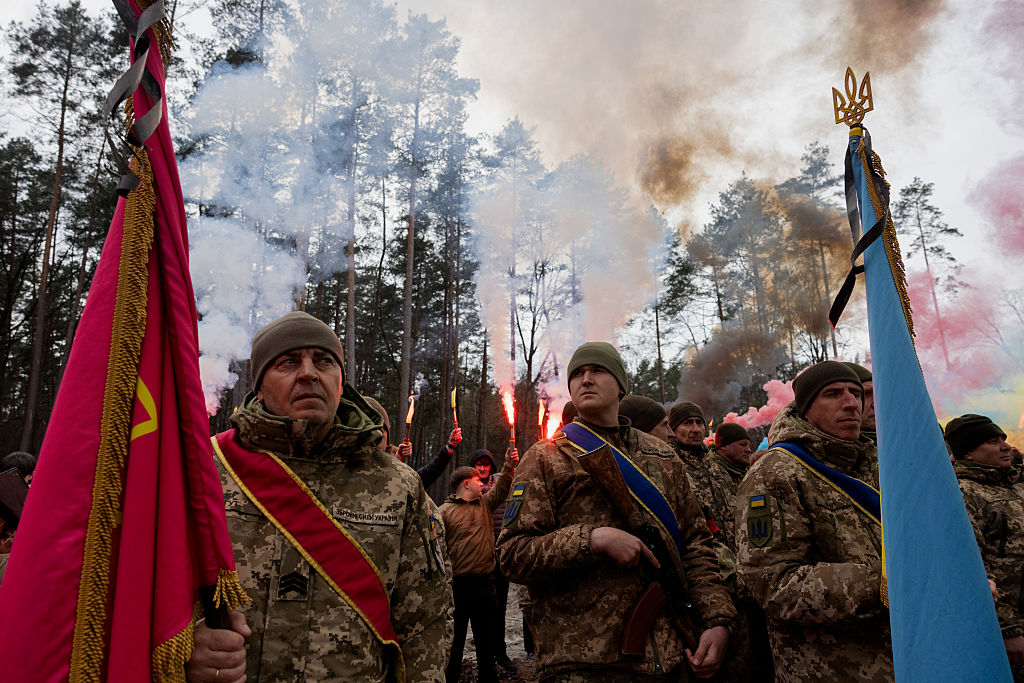 Mourners hold smoke flares during the funeral ceremony of 18-year-old Ukrainian servicemember Olexandr Samoilovich from the 1st Brigade, in the city of Slavuta. (Tetiana Dzahfarova / AFP via Getty Images)
Mourners hold smoke flares during the funeral ceremony of 18-year-old Ukrainian servicemember Olexandr Samoilovich from the 1st Brigade, in the city of Slavuta. (Tetiana Dzahfarova / AFP via Getty Images)
Allies Open Their Wallets: Record $23.8 Billion Pledged at Ramstein Format Meeting
NATO allies committed more than 21 billion euros ($23.8 billion) in long-term military aid to Ukraine during the April 11 meeting of the Ukraine Defense Contact Group in Brussels. British Defense Secretary John Healey described the pledges as “record support” and warned that “2025 is the critical year for this war.”
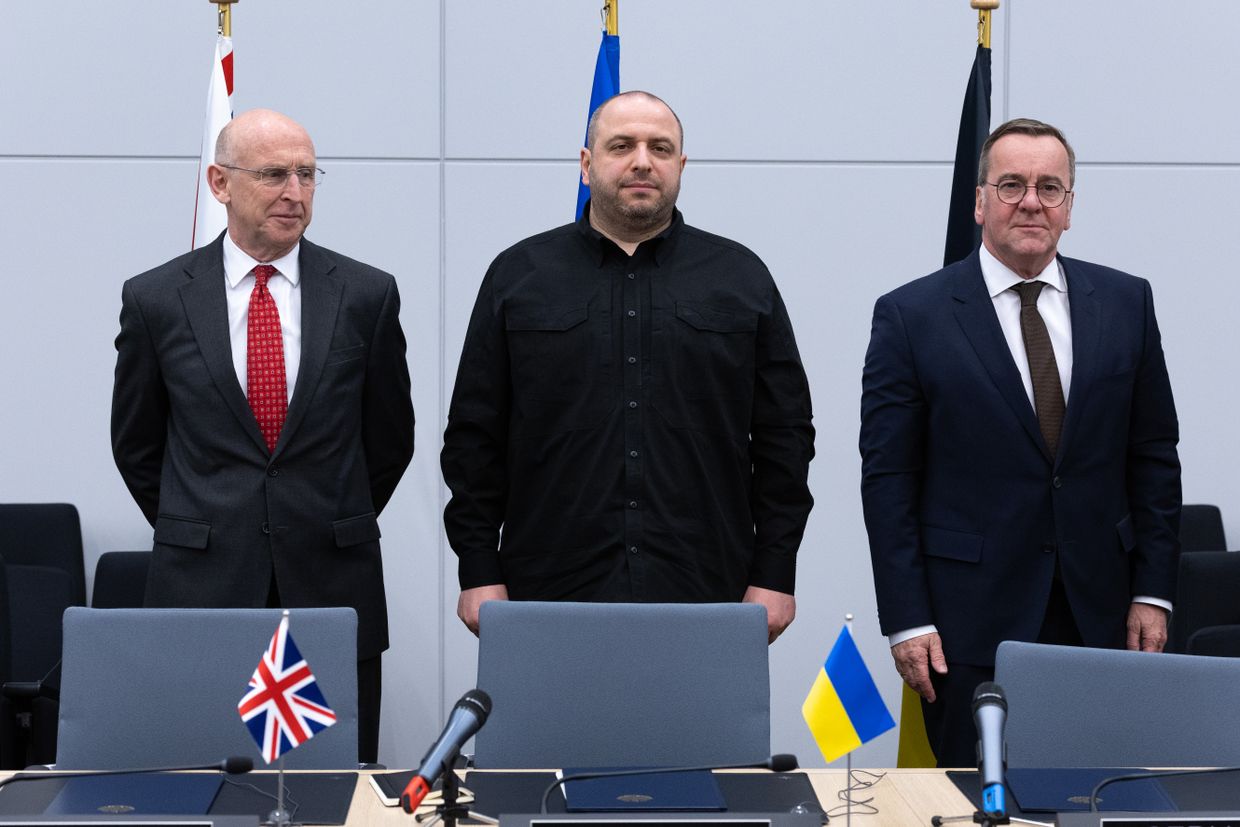 U.K. Secretary of State for Defense John Healy (L), Defense Minister Rustem Umerov (C) and Germany’s Defense Minister Boris Pistorius (R) stands after the signing ceremony of the letter of intent for a capability coalition for electronic warfare during the Ramstein summit in Brussels, Belgium. (Omar Havana/Getty Images)
U.K. Secretary of State for Defense John Healy (L), Defense Minister Rustem Umerov (C) and Germany’s Defense Minister Boris Pistorius (R) stands after the signing ceremony of the letter of intent for a capability coalition for electronic warfare during the Ramstein summit in Brussels, Belgium. (Omar Havana/Getty Images)
London has allocated 4.5 billion pounds ($5.8 billion) for Ukraine in 2025—its largest annual contribution to date. Germany announced it would send four IRIS-T air defense systems, 15 Leopard 1 tanks, 25 Marder infantry fighting vehicles, 14 artillery pieces, 120 MANPADS, and 100,000 artillery shells, with a contribution totaling 11 billion euros (nearly $14.4 billion) through 2029.
The Netherlands allocated 150 million euros ($170 million) to boost Ukraine’s air defenses, while Lithuania pledged 20 million euros ($22 million) for ammunition purchases. Estonia will deliver 10,000 155mm artillery shells and 750,000 ration packages.
“The message was understood very clearly, that the support for Ukraine cannot diminish,” Lithuania’s Defense Minister Dovile Sakaliene told journalists on the sidelines of the summit.
The St. Petersburg Talks: Trump’s Envoy Meets Putin for Third Time
U.S. Special Envoy for the Middle East Steve Witkoff met with Russian President Vladimir Putin in St. Petersburg, continuing discussions about the war in Ukraine. The meeting, which lasted four and a half hours according to state news agencies, was their third encounter since February.
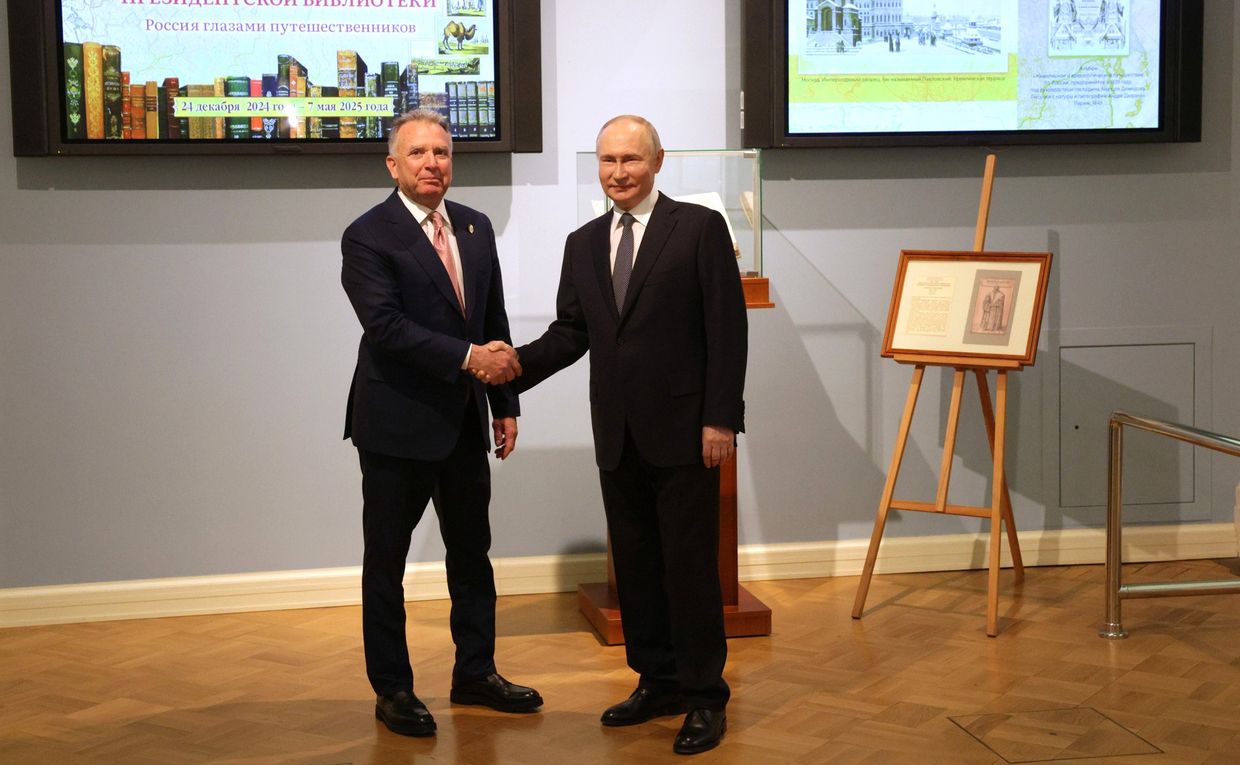 Steve Witkoff, U.S. President Donald Trump’s Special Envoy to the Middle East, shakes hands with Russian President Vladimir Putin in St. Petersburg, Russia. (Russian Presidential Office)
Steve Witkoff, U.S. President Donald Trump’s Special Envoy to the Middle East, shakes hands with Russian President Vladimir Putin in St. Petersburg, Russia. (Russian Presidential Office)
Kremlin Spokesperson Dmitry Peskov had earlier downplayed expectations, saying one should not “expect any breakthroughs” and describing the meeting as part of the process of normalizing relations and “searching” for a way to settle the war in Ukraine. Following the talks, the Kremlin released a brief statement saying the meeting “focused on various aspects of the Ukrainian settlement,” without elaborating.
White House Press Secretary Karoline Leavitt described the Putin-Witkoff meeting as another step in the negotiating process toward a ceasefire and an “ultimate peace deal” in Ukraine.
Prior to the meeting, Trump posted on Truth Social that “Russia has to get moving. Too many people are dying, thousands a week, in a terrible and senseless war—a war that should have never happened, and wouldn’t have happened, if I were president.”
Russia Rejects Territorial Compromises: Lavrov Dismisses Return to 1991 Borders
Russian Foreign Minister Sergei Lavrov stated that Ukrainian President Volodymyr Zelensky will have to accept territorial concessions and that it is “impossible” for Ukraine to return to its 1991 borders—Ukraine’s internationally recognized boundaries.
Lavrov attempted to deflect blame for Russia’s intransigence onto Zelensky and Ukraine’s alleged mistreatment of Russian speakers in Ukraine. His comments came following a Commonwealth of Independent States (CIS) foreign ministers meeting in Almaty.
The Kremlin continues to explicitly demonstrate its unwillingness to make compromises and cede Russian-occupied territory in Ukraine as part of any future peace negotiations—in contrast to Ukrainian officials who have expressed willingness to make territorial compromises in a future peace agreement.
Sanctions Relief for Air Links: Lavrov Demands Aeroflot Sanctions Lifted
Russian authorities continued efforts to extract concessions from the United States while delaying progress toward peace in Ukraine. Lavrov claimed that commercial air services between Russia and the United States should only resume as the “consequence” of the United States lifting sanctions imposed on Russian state-owned airline Aeroflot.
Lavrov claimed that the United States agreed to Russia’s proposal during talks in Riyadh on February 27, but that the United States has not taken any corresponding action. His recent statements directly contradict CEO of the Russian Direct Investment Fund (RDIF) Kirill Dmitriev’s April 3 statements on Fox News that Russia is not requesting sanction relief, showcasing the Kremlin’s inconsistent messaging.
Birthing an E-Warfare Coalition: New Initiative Launched in Brussels
Ukraine and its Western partners launched an electronic warfare coalition during the Ukraine Defense Contact Group meeting in Brussels. Defense Minister Rustem Umerov announced that the coalition, consisting of 11 countries, will focus on purchasing equipment, training specialists, and developing electronic warfare policies and doctrines.
“Electronic warfare is a critical component of modern warfare. No unit can be fully combat-ready without effective electronic warfare,” Umerov wrote on Facebook. “The coalition is designed not only to meet the current needs of the Ukrainian army in electronic warfare, but also to lay the foundation for the long-term development of these capabilities.”
The initiative is the latest of several Western coalitions supporting Ukraine, joining existing artillery, fighter jet, and demining coalitions organized within the Ramstein format.
Estonia Intercepts Russian Shadow Fleet Vessel in Baltic Sea
The Estonian Navy detained an oil tanker belonging to Russia’s “shadow fleet” in the Gulf of Finland, according to Estonian Navy Commander Cdre Ivo Värk. The vessel, called Kiwala, was detained off the Estonian coast while en route to the Russian port of Ust-Luga.
Previously sanctioned by the EU, UK, Canada, and Switzerland, the tanker lacks a flag state, meaning it is not authorized to sail in international waters. The move marks Estonia’s first detention of a shadow fleet vessel—a network of aging tankers Russia uses to circumvent international sanctions.
“We are acting in a coordinated and targeted manner to protect our security and environment, and we are implementing our right to check suspected ships passing through Estonia’s exclusive economic zone,” Estonian Foreign Minister Margus Tsahkna said.
There were 24 people on board, according to the navy chief. The vessel’s captain is a Chinese citizen, and the rest of the crew are nationals of Myanmar.
Battlefield Developments: Russian Forces Advance on Multiple Fronts
Russian forces recently advanced near Kupyansk, Siversk, Novopavlivka, and Velyka Novosilka. Geolocated footage shows Russian forces conducting an attack with armored vehicle support north of Stepova Novoselivka (southeast of Kupyansk), advancing south of Vasyukivka (southwest of Siversk), pushing northeast of Nadiivka (east of Novopavlivka), and gaining ground east of Shevchenko (northwest of Velyka Novosilka).
Ukrainian sources continue to speculate about which directions Russian forces will prioritize in Spring and Summer 2025. Ukrainian Presidential Office Deputy Head Pavlo Palisa told Reuters that Russian forces will likely intensify offensive operations in April and May 2025 and will continue to prioritize the Pokrovsk direction. A source in the Ukrainian General Staff told BBC’s Ukraine Service that Russian forces intend to create a buffer zone in northern Sumy Oblast and threaten Sumy City in the coming months.
The Ukrainian Air Force reported that Russian forces launched 39 Shahed and decoy drones from the directions of Kursk and Oryol cities; Millerovo, Rostov Oblast; and Primorsko-Akhtarsk, Krasnodar Krai overnight on April 10-11. Ukrainian forces shot down 24 drones over northern, southern, eastern, and central Ukraine, while 13 decoy drones were “lost,” likely due to electronic warfare interference. Russian drones damaged infrastructure in Donetsk, Dnipropetrovsk, Kharkiv, and Zhytomyr oblasts.
Reports Emerge of 51 Chinese Citizens Fighting for Russia
Russian opposition media provided additional details regarding Russia’s efforts to recruit Chinese citizens to serve in Ukraine. Russian opposition outlet Vazhnye Istorii, citing official documentation and contract recruitment data from June 2023 to May 2024, reported that Russian registration and enlistment offices in Moscow Oblast processed at least 51 Chinese nationals applying to service in the Russian military.
Most of the Chinese nationals arrived in Moscow shortly before signing military service contracts, with some arriving in pairs at the recruitment point. At least four Chinese nationals reportedly returned to China after visiting the recruitment office, while several others have returned after concluding their one-year term of service.
The report follows Ukrainian claims that “several hundred” Chinese citizens are fighting for Russia. President Zelensky said on April 11: “This means Russia is clearly trying to prolong the war—even by using Chinese lives.”
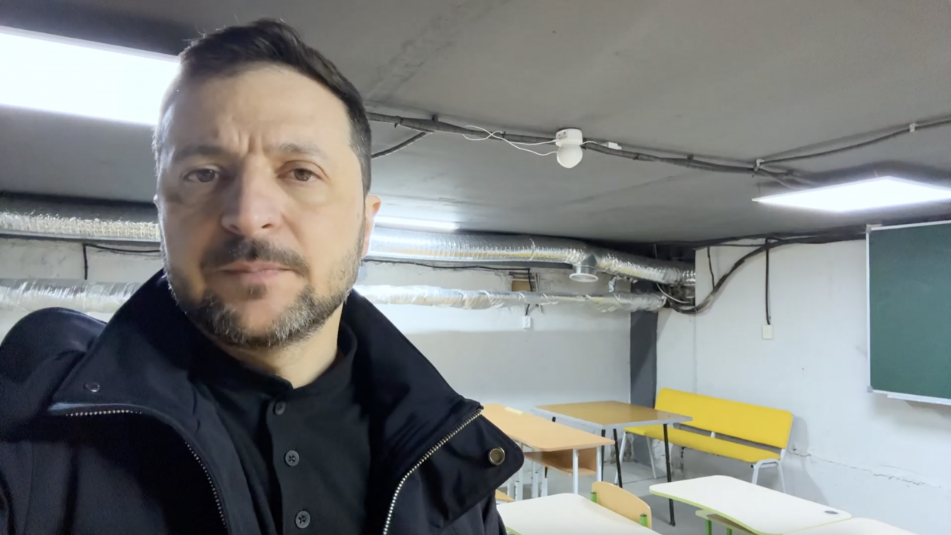 President Volodymyr Zelensky delivers his evening address while sheltering in an underground school in Kryvyi Rih, Dnipropetrovsk Oblast. Three children who were killed in a deadly Russian missile attack on April 8 studied at the school (Presidential Office)
President Volodymyr Zelensky delivers his evening address while sheltering in an underground school in Kryvyi Rih, Dnipropetrovsk Oblast. Three children who were killed in a deadly Russian missile attack on April 8 studied at the school (Presidential Office)
Deputy Defense Minister Resigns Amid Procurement Reform Debates
Lieutenant General Ivan Havryliuk announced his resignation as first deputy defense minister of Ukraine. Havryliuk told Ukrainian media outlet Suspilne that he is stepping down voluntarily, without elaborating on the reason for his decision.
Havryliuk, who was in charge of procurement at the Defense Ministry, was at the center of debates over defense procurement reform. His resignation follows criticism from pro-reform MPs and anti-corruption activists regarding the ministry’s plans to merge the Defense Procurement Agency (DPA) and the State Rear Operator (DOT), sister agencies overseeing different aspects of military procurement.
The defense procurement sector was reshaped in December 2023, aiming to meet NATO standards, with the two separate agencies created to handle different aspects of military supplies. Havryliuk had announced on April 7 that the ministry planned to merge these agencies after martial law is lifted.
Ukraine Establishes Diplomatic Ties with Somalia
Ukraine and Somalia formally established diplomatic ties during the Antalya Diplomatic Forum in Turkey, Ukrainian Foreign Minister Andrii Sybiha announced. “I signed relevant protocol with Somalia’s State Minister for Foreign Affairs and International Cooperation, Ali Mohamed Omar,” Sybiha wrote on social media. “We appreciate Somalia’s support for Ukraine’s sovereignty and territorial integrity.”
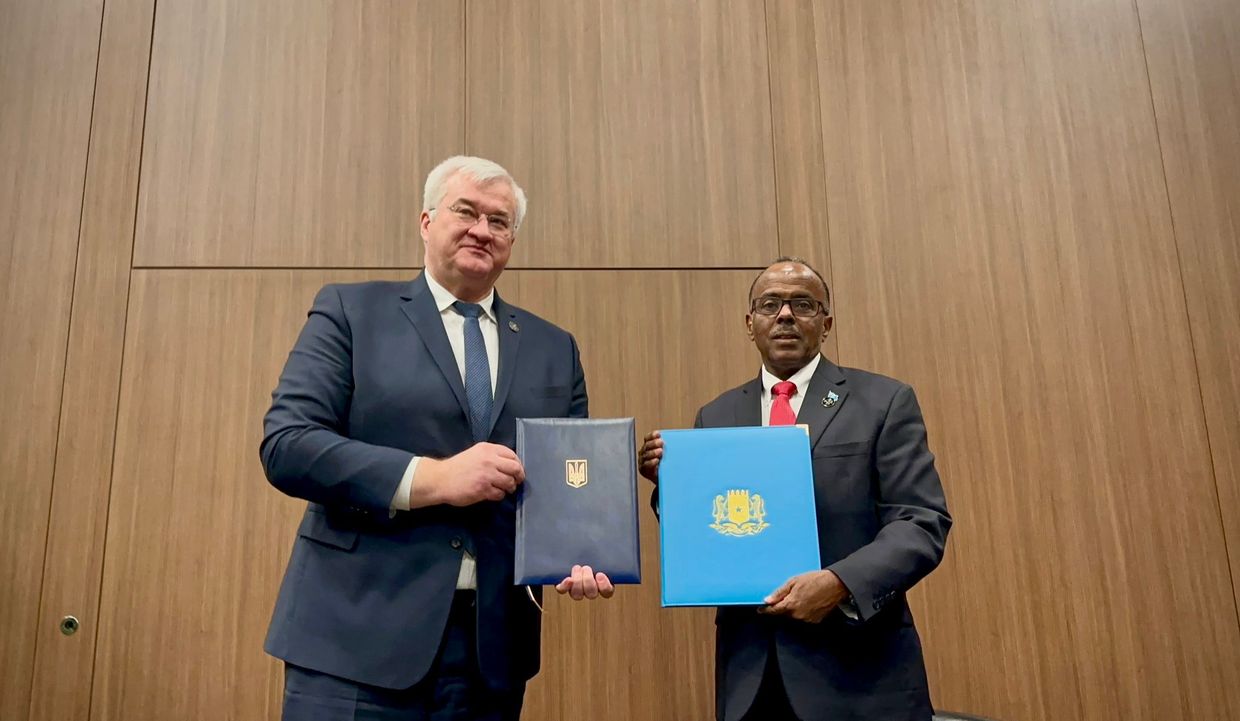 Ukraine and Somalia formally established diplomatic ties during the Antalya Diplomatic Forum in Turkey. (Foreign Minister Andrii Sybiha / X)
Ukraine and Somalia formally established diplomatic ties during the Antalya Diplomatic Forum in Turkey. (Foreign Minister Andrii Sybiha / X)
The move marks a significant expansion of Ukraine’s diplomatic outreach in Africa, where Kyiv has sought to build new partnerships amid Russia’s attempts to bolster its influence across the continent. Somalia has voiced consistent support for Ukraine’s territorial integrity, while Ukraine has extended humanitarian assistance to Somalia through its “Grain from Ukraine” initiative.
Putin Emphasizes Naval Ambitions: Development Strategy Through 2050
Russian President Vladimir Putin held a meeting on April 11 to discuss Russia’s development strategy for the Russian Navy through 2050. Putin claimed that the Russian Navy plays a “vital role” in ensuring Russia’s security and defense and in protecting Russia’s national interests in the “World Ocean.”
Putin stated that one of Russia’s priority tasks is to strengthen its naval strategic nuclear forces. He noted that Russia has allocated “significant funds” towards constructing 49 vessels in the past five years and that Russia has allocated 8.4 trillion rubles (about $100.9 billion) toward the construction of new vessels in the coming decade.
The Russian leader highlighted the Zircon cruise missile, claiming that the missile has a range of over 1,000 kilometers and a speed of nearly Mach 10. Putin also called for Russia to develop ship-based unmanned aircraft systems and unmanned underwater and surface boats and to integrate these unmanned systems into a “single reconnaissance and strike [system], linked to [Russia’s] satellite group.”
Looking Ahead: May 9 Ceasefire Possibility
Estonian Defense Minister Hanno Pevkur speculated that Moscow may attempt to strike a ceasefire deal with the United States on May 9—the day Russia celebrates victory in World War II. “Take February 24 [when Russia launched its full-scale invasion]. February 23 is the day of the Russian Army. For the Kremlin, always, dates are very important,” Pevkur told journalists in Brussels.
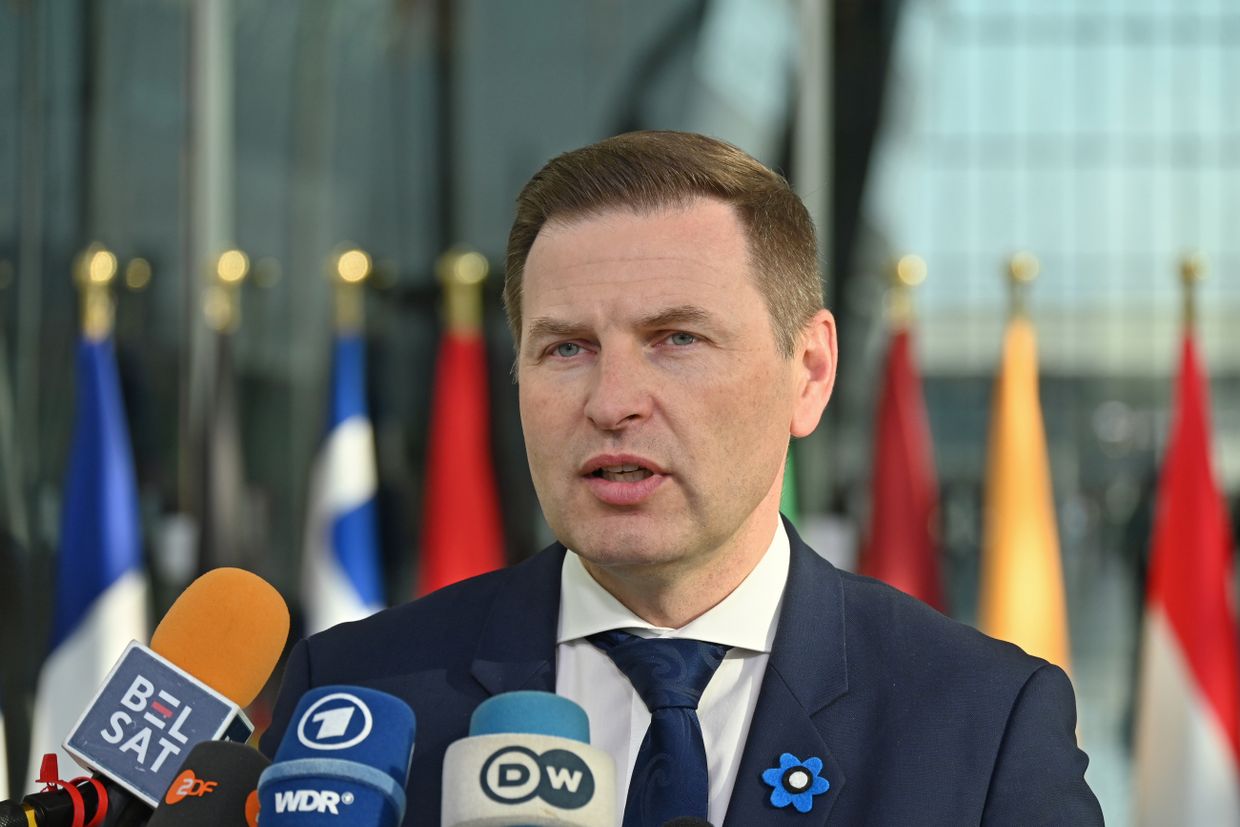 Estonian Defense Minister Hanno Pevkur speaks to media representatives at NATO headquarters in Brussels. (Anna Ross/picture alliance via Getty Images)
Estonian Defense Minister Hanno Pevkur speaks to media representatives at NATO headquarters in Brussels. (Anna Ross/picture alliance via Getty Images)
“So this is why I believe that also May 9, which is for us the day of Europe, for Russia is the day of ending the Second World War, they will strive probably towards this to get some kind of deal, some kind of ceasefire or whatever.”
His comments suggest that the date’s symbolic importance in Russia might influence the timing of any potential diplomatic breakthrough, adding another layer of complexity to the uncertain path toward a negotiated settlement to the war.
